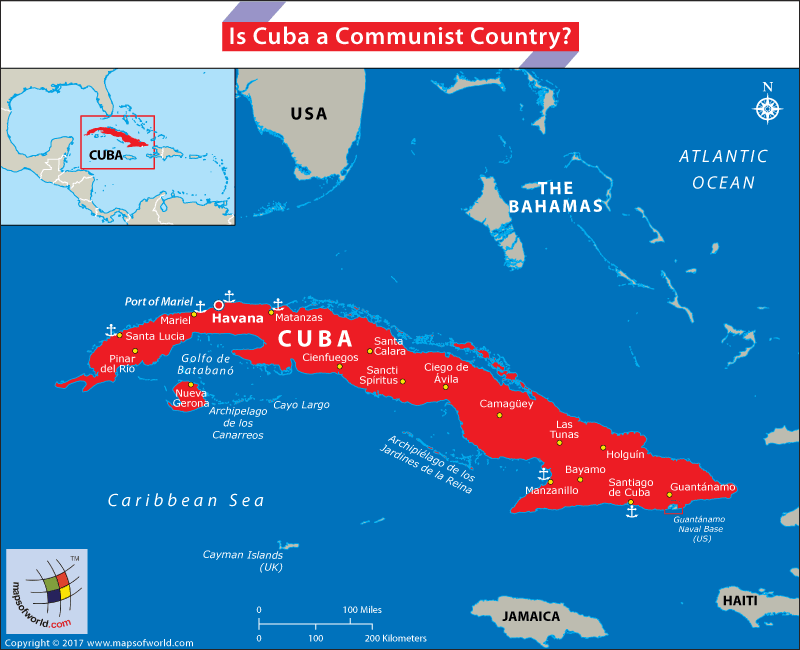Is Cuba a Communist Country?
Cuba, to be specific, is a socialist country that for more than 50 years has been governed by the Communist Party of Cuba. The Constitution of the country states that the Communist Party of Cuba would be the vanguard of the people and the “leading force of society and the state”. In short, Cuba is a Marxist–Leninist socialist state guided by the political ideas of Marx, Engels, and Lenin.
In 1959, Fidel Castro and fellow Cuban Revolutionaries overthrew the US-backed Batista dictatorship and established a one-party state rule. Fidel Castro was the Communist Revolutionary who ruled Cuba with an iron fist for nearly five decades. In 2008, he handed over the reins to his younger brother Raul Castro but was still very much behind the scene in the country’s politics until his death in November 2016.
Castro exercised control over all aspects of the Cuban state through the Communist Party and its affiliated organizations, the bureaucracy and the state security apparatus. He also gained immensely from the Cold War, relying on the Soviet Union’s support for decades. Cuba got annual subsidies worth $4 billion to $5 billion from the Soviet government during that period.
The US placed a trade embargo on Cuba, which was lifted only in 2014. When the Soviet Union disintegrated, almost a third of Cuba’s economy disappeared. In the 2000s, there was a surge again with Venezuela providing petroleum at preferential terms. After the 2008-09 financial crisis, the economy has yet recovered and has maintained a 2% growth rate.
Cuba is always trying to strike a balance between political control and reforming the socialist economic system. The first Cuban Communist Party Congress in 13 years, was held in 2011, where a plan for wide-ranging economic changes was approved. These included the right to buy electronic appliances and cell phones, stay in hotels, buy and sell of used cars, and real estate.
State sector jobs were cut, and the economy was opened to accommodate the self-employed class of people and entrepreneurs. Other reforms include allowing private farmers to sell agricultural products directly to the hotels, allowing the creation of non-agricultural cooperatives, and adopting a new foreign investment law.
The launch of Special Development Zone near the Mariel port in September 2013 was a big move to introduce reforms in the economy and to attract foreign investment and support from the US. It certainly helps that Cuba is the key to the Gulf of Mexico, and the port would serve as a transportation hub and warehouse center.
Cuba’s communist ideology promises universal literacy and quality education for all with one teacher for every 10 Cuban students. There is a free healthcare system which even attracts people from other countries, and in fact, is quite a revenue generator for the economy. There is not much official crime.
On the other hand, Cuba suffers from grinding poverty. The public transport system of the country has not been adequately developed in spite of roads being in excellent condition. The regime is inherently repressive. Imprisoning political dissidents is quite common in the country, and some political prisoners have been imprisoned for more than 20 years as well. There are restrictions on the freedom of speech and media, assembly and movement; all this while the country’s leaders are known for delivering long speeches both in the country and outside.
Cuba also suffers from the problem of illegal emigration. Citizens have been departing Cuba and entering the US using homemade rafts or even alien smugglers. Non-maritime routes like direct flights to Miami, overland visa via the southwest border have also been made use of for the same. With the improvement in Cuban-US relation since 2014, the migration to the US has increased. However, the Donald Trump administration in the US had announced placing travel restrictions on the Cuban government in 2019; in light of this new development, it needs to be seen what unfolds in the socialist system of Cuba.
Raul Castro had announced stepping down as President in 2018. But he has said that he would continue to hold his position in the communist party, and as head of the military, thus exercising control over the more powerful mechanisms of the party; the military. Cuba’s military still controls 65% of Cuba’s economy, including its flourishing tourism industry. The centralized political structure that has been in place for more than 50 years has penetrated the military, political, economic, and the social system, and is likely to maintain its status quo.
Related Maps:

